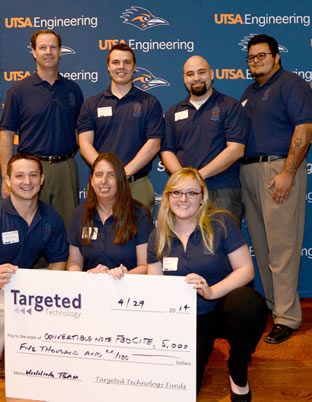Posted on May 6, 2014 by Lety Laurel

Mediflow team members
 Mediflow, a team comprised of seven undergraduates, triumphed at the $100K Student Technology Venture Competition presented by the UTSA Center for Innovation and Technology Entrepreneurship (CITE). The UTSA students developed a prototype sleep apnea device and wrote a business plan to market the technology.
Mediflow, a team comprised of seven undergraduates, triumphed at the $100K Student Technology Venture Competition presented by the UTSA Center for Innovation and Technology Entrepreneurship (CITE). The UTSA students developed a prototype sleep apnea device and wrote a business plan to market the technology.
UTSA competitors Velox Medical and Vitalassure respectively placed second and third in the business planning competition at the UTSA Main Campus.
It is estimated that 22 million Americans suffer from sleep apnea, a disease that prevents a person from getting solid sleep. Left untreated, sleep apnea can lead to high blood pressure, chronic heart failure, atrial fibrillation, stroke, type 2 diabetes, depression, traffic accidents and other sleep-deprivation related accidents.
The Mediflow team developed a commercially viable business plan for a CPAP (continuous positive airway pressure) device that is smaller, more mobile, and aims to be more comfortable than other CPAP devices currently on the market. It integrates the blower into the facial mask itself and the power supply attaches to the body, which eliminates the need for a hose and anchored power supply.
Mediflow includes undergraduate engineering majors Joseph Barrios , Eluid Gutierrez , Aaron Mosqueda and Maxim Perkins and undergraduate business majors Nancy Perdicho , Spencer Reynolds and Kaleigh Simms . The Mediflow team won $2,000 cash and several in-kind business resources.
“It feels amazing to win, and it’s great to see our hard work pay off,” said Spencer Reynolds, senior business management student. “Everyone put in a lot of hours. We’re really excited about this product and are hopeful for its future.”
“Mentoring this group was a fantastic experience,” said San Antonio medical device consultant Mark Standeford , who served as Mediflow’s business mentor for the competition. “They identified a good opportunity, structured a good business plan around that opportunity, and even if they hadn’t won first place, they would have a winning commercial product.”
Second-place winner Velox Medical developed a device that aids in endovascular surgery and recovery for a patient who has had a brain aneurysm. The team includes engineering majors Andrew Casterlin , Ivana Escobar , Derek Kohlenberg and Noel Manuel , business majors Jon Ambach and James Whetstone , and mentor Neal Vail . The Velox Medical team won $1,000 cash and several in-kind business resources.
Third-place winner Vitalassure developed a wireless device that monitors the flow of IV fluid to a patient. The team includes engineering major Jacob Kantor , business majors Luis Gonzalez and Greg Bishop , and mentor Ian Clements . The Vitalassure team won $500 cash and several in-kind business resources.
During the competition, local academic, business and entrepreneurial experts judged the teams on their technology, business plan and presentation.
This year’s judges included Patrick R. Condon and Dirk Elmendorf , co-founders of Rackspace; Gary Frashier , president of Management Associates; Randall Goldsmith , investor in residence for the Texas Technology Development Center; Lorenzo Gomez III , executive director of the 80/20 Foundation; Teryn Grater of ATKG CPAs LLP; George E. Karutz Sr . of Karutz Capital and Texas Research & Technology Foundation; Norman L. Jacobson , owner of iMageDent Management and Development Services; and Peter Savas , CEO of StemBioSys Inc.
The other teams included:
· ATI (Applied Technological Innovations), which developed the Simple Proactive Emergency Extraction Device (SPEED), an emergency backboard capable of adjusting to the shape of a person as found in a damaged vehicle so they can remain in that position on the way to the hospital.
· BoardBaby , which designed a website that serves as an online corkboard for parents to keep the special moments of their children in one secure, convenient place.
· da Vinci Technologies , which developed the Heat Tap, a patentable technology that simultaneously reduces air-conditioning and clothes dryer power consumption in homes in order to reduce both energy consumption and the energy bill.
· ELIXIR , which designed a lumbar therapy belt that provides hot, cold and alternating therapy, coupled with a bladder that inflates within a back brace to increase pressure for therapeutic and heat transfer.
· Phenom Fitness , which developed a sparring glove that incorporates a resistance band shock absorber that also serves as an exercise workout band.
· Genie Innovation , which designed the ET Clean, a device that keeps the airway path clear of mucus that typically restricts oxygen flow to a patient after a tracheal intubation.
· PalmKEG , which designed a device that, when paired with a vacuum-insulated growler, retains ideal pressure and temperature for transporting and dispensing beer.
“UTSA has established itself as San Antonio’s university pipeline for young tech entrepreneurs,” said Cory Hallam , UTSA chief commercialization officer and CITE director. “This competition highlights the skills these students have honed during their undergraduate degrees, under the watchful eye and guidance of great faculty like Professors Allo, Johnson, Leffel and Simonis. Their successes will enable us to continue to grow tech entrepreneurship at UTSA for years to come.”
Established in 2007 and held semi-annually, the $100K Student Technology Venture Competition offers UTSA’s undergraduate senior business and engineering students the opportunity to build a technology, patent it, create a business and launch it in a rigorous incubator program. The top three teams have access to a prize pool of more than $100,000 in funding and in-kind services to launch their new companies.
The founding sponsor of the competition is the Texas Research Technology Foundation (TRTF). New and continuing sponsors include Cox|Smith, Rackspace and the San Antonio Technology Center, and is supported by the following UTSA entities: College of Business, College of Engineering and Office of the Vice President for Research.


